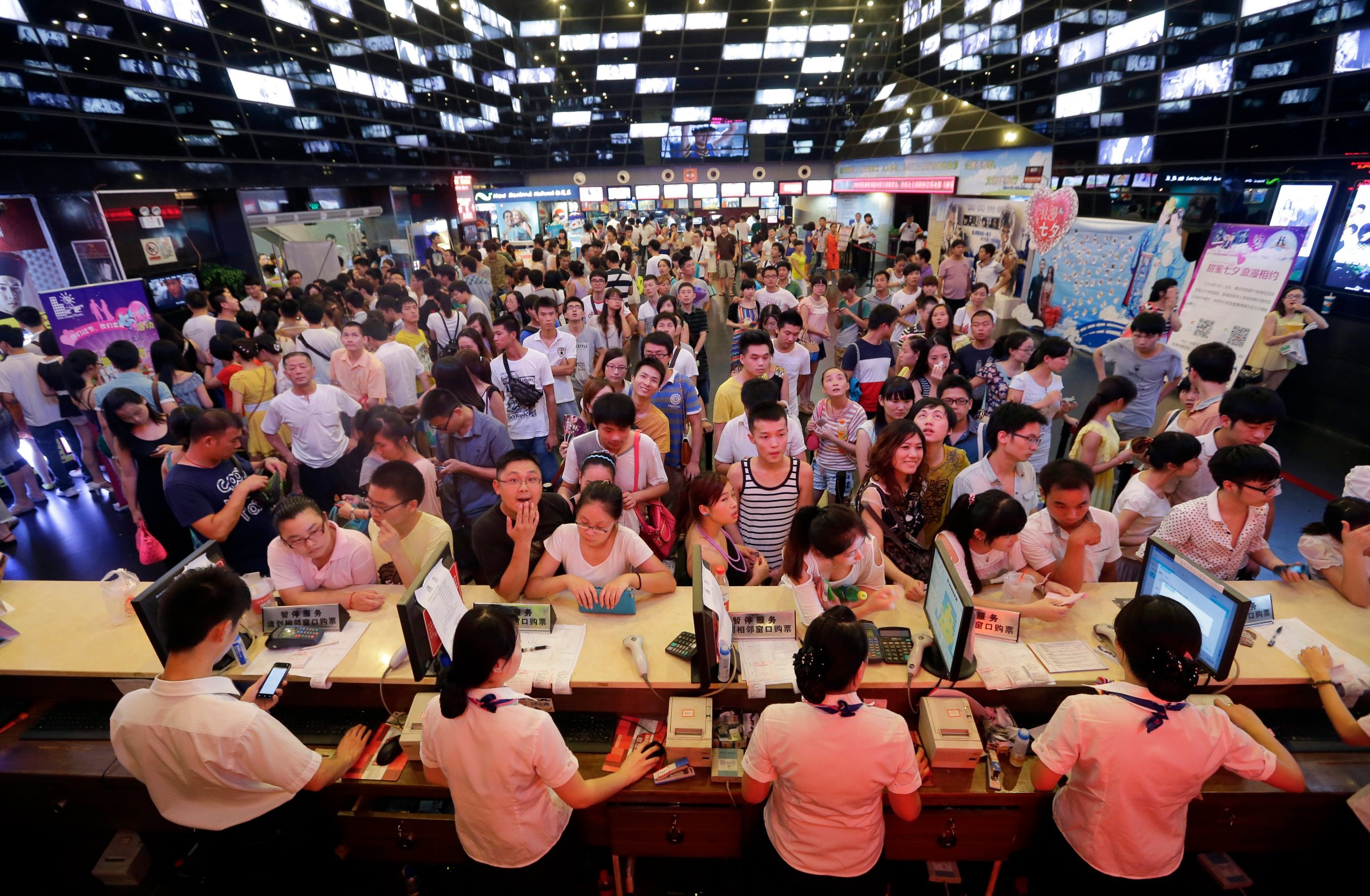
Amid a summertime box office slump in the world’s second-largest movie market, China’s communist leaders think they know what’s ailing the nation’s entertainment industry: spoiled actors who have traded in their Little Red Books for overly commercial playbooks. In a Monday meeting, during a review of a draft law that will govern the film sector, China’s top political advisers said movies needed to be more “centered on the people, guided by core socialist values,” according to the state-run Xinhua newswire. Chinese Vice Premier Liu Yandong counseled for more films with “backbones, morality and warmth.”
Despite rampant censorship and stringent government limits on the import of foreign films, the Chinese movie market has been sold as a panacea for Hollywood. As early as next year, moviegoers in China could supplant those in North America as the world’s biggest film audience. Western directors are partnering with Chinese companies to tap this burgeoning market. But even as Hollywood (and its Chinese investors) tailors content for Chinese audiences — no Chinese bad guys, please! — the nation’s entertainment czars have been tightening the noose on free expression back at home.
Quiz: Are You Ready for Back to School?
Already, censors have banned cleavage, time travel and one-night stands from Chinese TV shows. Since July, prime-time slots have been reserved for local programs that emphasize “socialist core values, as well as patriotism and Chinese fine traditions.” On Aug. 29, the national media regulator warned local news programs not to “express overt admiration for Western lifestyles,” according to Xinhua.
The draft film law now making its way through China’s rubber-stamp political process demands “excellence in both professional skills and moral integrity” from those in the Chinese movie business. What exactly constitutes such excellence is not clear. Two years ago, the state media watchdog banned distribution of movies made by anyone with a criminal record. “Tainted artists,” who might have indulged in drug use or prostitution, will be barred from receiving domestic awards, according to the draft law.
Read More: China Imposes Harsh New Controls on Foreign-Inspired TV Shows
The proposed law also takes aim at a booming Chinese postproduction business that helps Hollywood churn out films more cheaply with local labor. Chinese companies will not be able work on foreign films that could “harm national dignity and interest of China, cause social instability, or hurt the national feeling.” Now that Chinese investors own Hollywood studios and cinema chains, the draft law could potentially hinder the global film-production process.
The Chinese Communist Party has long used the arts to promote socialist values. Chairman Mao Zedong’s wife Jiang Qing, an actress, directed revolutionary ballets and operas. Peng Liyuan, the country’s current First Lady, was for many years far more famous than her husband Xi Jinping because of the patriotic fare she sang as a member of the People’s Liberation Army’s entertainment troupe. In 2014, President Xi decried artists who “are salacious, indulge in kitsch, are of low taste and have gradually turned their work into cash cows, or into ecstasy pills for sensual stimulation.”
Read More: China’s Censors Are Leaving the World’s Most Populous Nation With Very Little to Watch on TV
Late last week, state broadcaster CCTV deemed the nation’s actors “vastly overpaid,” as the state media watchdog ordered film guilds to engage in “self-discipline on the appropriate remuneration of actors and actresses.” Some of the summer’s biggest cinematic flops in China have been studded with celebrities. “We finally have an audience backlash,” says China film consultant Rob Cain, “against cynically made movies that just put a star in without worrying about artistic execution,”
Monday’s meeting in Beijing was dedicated to encouraging innovation in China’s film world. But can communist apparatchiks deliver more than a commercially minded movie industry? Xi has grand ambitions for China’s culture. “Fine-art works,” China’s President has said, “should be like sunshine from blue sky and breeze in spring that will inspire minds, warm hearts, cultivate taste and clean up undesirable work styles.” That’s a lot to ask of any film, and recent efforts to inject communist values into Chinese movies have underwhelmed at the box office. “The government gets in the way at every step in China,” says Cain, of a film industry beholden to censorship and other official limits. “Your overriding concern is: ‘Am I going to be O.K.?’ You’re serving a taskmaster that trumps the audience. That doesn’t tend to make for great films.”
More Must-Reads from TIME
- Cybersecurity Experts Are Sounding the Alarm on DOGE
- Meet the 2025 Women of the Year
- The Harsh Truth About Disability Inclusion
- Why Do More Young Adults Have Cancer?
- Colman Domingo Leads With Radical Love
- How to Get Better at Doing Things Alone
- Michelle Zauner Stares Down the Darkness
Contact us at letters@time.com